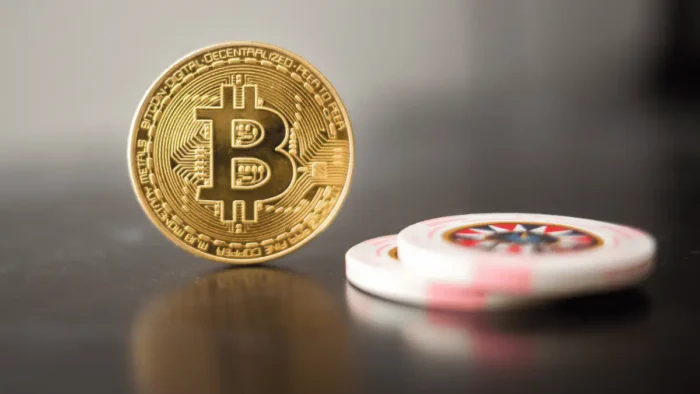The idea of cryptocurrencies “taking over” to become the dominant form of money is just as likely as the dollar completely vanishing. While there are some advantages to being paid in Bitcoin, you’re probably better off keeping your salary 100% fiat.
We want to find out if regular family finances can be supplemented with crypto investments or if it’s just scammy hype. First, we’ll talk about what cryptocurrencies are and see what they mean for our financial system. Then we’ll discuss whether or not investing in them makes sense (spoiler alert: it probably doesn’t). The takeaway? As much as you might want to make money with crypto, step one is making sure your paycheck is still paper.
What’s a Cryptocurrency?
In the simplest terms, a cryptocurrency is a digital currency. We’re not talking about PayPal or Venmo transactions here, though. Instead of being created and regulated by governments or big banks, peer-to-peer networks make and maintain currencies like Bitcoin. That means no one is in charge. Maybe you’ve heard about the idea of a “central bank” before – well, cryptocurrency has no “central bank.”.
The most common way to obtain a cryptocurrency is to use a unique exchange, like INX platform to trade fiat currency (like dollars) for it. Someone with 100 dollars can trade those dollars for some amount of cryptocurrency, depending on how much those dollars are worth at the time. (Don’t worry if this is confusing – we’ll cover it in more detail later.)
How’s a cryptocurrency like regular money?
Well, it can be used to trade for goods and services. It has a price set by the market, and the value of your coins changes depending on how much people want them. It can also be sold and traded with other people who have coins. Think of it like an advanced barter system or commodity market where transactions happen purely based on supply and demand.
What’s a cryptocurrency NOT like?
A cryptocurrency is not the same as regular money. Here’s why:
- Neither Bitcoin nor any other coin is regulated by any bank or government agency. This means a central entity doesn’t set its price, and its value can change without warning. There’s also almost no way to reverse a Bitcoin transaction once it’s happened. If you accidentally send your Bitcoin to the wrong address, or someone steals them from you, there’s almost no way to get them back. That’s true of nearly all cryptocurrencies, but it’s especially true of Bitcoin since it was the first.
- It doesn’t mean banks won’t exist anymore. A lot of people think “cryptocurrency” means “no government control.” That’s not the case – cryptocurrencies are built on top of blockchain technology, which is used for many other things besides transferring money. Blockchain can be used to digitize anything from property records to voting rights. Even non-financial uses for cryptocurrency within blockchain – like creating a digital ID that other people can verify.
So is it possible to use cryptocurrency for regular family finances?
You can use Bitcoin and other cryptocurrencies for a few things:
- Buying and selling things: You can buy and sell products and services using Bitcoin and other coins. Since the digital coin has no physical form, you can’t literally hand them over to a friend in exchange for services rendered. However, you might want to use bitcoin as a way of paying people in “swaps” if they’re less likely to accept your real money than services rendered. (Give someone $100 in bitcoin for each hour they babysit your kids.) For another type of payment, direct debits may make more sense.
- P2P payments: Some people use Bitcoin and other cryptocurrencies to transfer funds directly from one person to another. It’s a sort of simple barter system, but with anonymity and slightly more risk. If you want to send someone $100 in Bitcoin, that’s fine – they’ll know that you sent the money and who it came from, but they won’t know who gave it to them. (But they should still be careful about keeping their identity hidden.)
- P2P loans: You can also make a loan using Bitcoin or other coins. This is great because the loan doesn’t require a middleman like an “exchange” platform like Paypal or Square. You can give someone $100 worth of Bitcoin and tell them to pay it back at any time – they’re free to keep the money for themselves or return it.
But this doesn’t mean stable family finances can be replaced with crypto investments:
- If you want to buy a house: If you want to buy a house with cryptocurrency, you won’t be able to. Cryptocurrencies can be used as an investment but not as a form of payment. For example, suppose you wanted to use cryptocurrency as part of a mortgage. In that case, you’d need something very similar to the cryptocurrency exchange service Venmo which allows people to send digital cash directly from their phones.
- If you don’t want to trade your dollars for something that can change the value without warning: As we said before, if you pay someone in Bitcoin for their services, they’re not obligated to return the money. You can design payments that require specific kinds of services or fees, though – if the person delivering the service doesn’t need to be paid via cryptocurrency, there’s no risk your payment will be lost.
- If you need to pay taxes: There are some significant questions about how tax agencies will treat cryptocurrencies. People have been having trouble paying taxes on their digital currency profits since bitcoin was first introduced. Although almost all U.S. dealers must declare their trading gains, the IRS has warned that it can’t keep up with the number of returns.
On its face, paying taxes in crypto may make more sense than paying in dollars. Or it could make no sense at all depending on whether your country uses dollar-based tax codes, and it’s really up to each government agency.
Conclusion
Cryptocurrencies are fascinating to anyone interested in computer science or economics, but they pose considerable risks to anyone looking for a stable payment method. That doesn’t mean someone won’t create a trustworthy form of cryptocurrency in the future, but it will likely take years for that technology to become commonplace.





